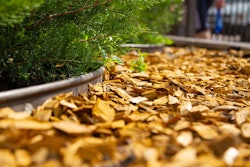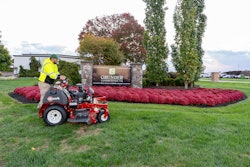Mark Leon’s passion for landscaping wasn’t ingrained as a teenager, or even as a young adult. An Oahu, Hawaii, native, Leon trained horses on the jumper/trainer circuit while attending college on the U.S. mainland’s west coast. He then started a successful business in California only to sell it and travel the world for six years. In 1990, Leon’s love for the outdoors led him home to start Sunshine Landscape.
He says the greatest and most challenging part about landscaping on Hawaii is the islands’ full growing season. “In most of the industry, people are trying to propagate growth; in Hawaii we’re trying to control it,” Leon explains. “There are so many microclimates within Oahu’s 70 square miles, and we have to consider pH factors when planting because the soil is coral based.”
The alkaline-based soil causes organic matter to break down quickly on the island, but also allows faster growth, Leon explains. Only 5 percent of Hawaii’s plants are indigenous, and most of them do not have a resistance against many pests and diseases because the island is so isolated. Many of the diseases and pests Leon deals with come from Asia and other Pacific islands.
Overcoming the past
Leon, like many mainland landscapers, has trouble finding good employees but for different reasons, he says. “Before the U.S. took over the Hawaiian Islands, sugar cane plantations provided for the residents’ well-being. Now, welfare does and it’s hard to find reliable employees with a good work ethic,” Leon says. “There is a whole generation that doesn’t want to work.”
Aside from what Leon describes as “culturally, a different value system,” he says the other reason he can’t find good workers is Hawaii’s economy. “The economy is booming, so the really good employees transfer to construction because there is so much work to be had.”
Land lover
When Leon started his business 18 years ago, his customer base was mostly individual homeowners. Now approximately 75 percent are commercial and only 25 percent are residential.
Property maintenance is where Leon focuses much of his time because “those are steady, ongoing jobs where we’ve made relationships and are respected for our work.” He knows many of the homeowners within the different homeowners’ associations and will stop to talk to them as he works.
Leon describes himself as a landscape contractor, certified arborist, technician and irrigation specialist. “A lot of our business is trees, and I travel the world to events and conferences to learn new techniques,” he says.
To protect trees as much as possible, he sprays a non-selective herbicide around the base of most so mowers, trimmers and edgers don’t cut into the bark. Leon contracts skilled tree climbers from the mainland to help him with seasonal work and special jobs.
A competitive edge
Leon prefers to own all of his equipment, and he insists on purchasing the best-quality machines and then maintaining them according to his high standards. “I use equipment for half its life and then sell it; there are a lot of people who appreciate well cared-for professional equipment,” he says.
He attributes the company’s growth to his attention to detail, using the most technologically advanced and reliable equipment, and old-fashioned hard work.
“I expect my crew to learn and better themselves through hard work and education,” Leon says. “If you stay stagnant, you fall behind.” He says remaining competitive is the reason he is in the field each day, working just as hard as his employees.
He also insists proper OSHA-approved safety measures are used at all time. “All of my guys wear protective eyewear and ear protection. I constantly relay safety information to the crew, especially when they are working,” Leon says. “There’s no better way to learn than by doing things right the first time.”
Being involved in industry organizations is important to Leon because “the landscaping industry in Hawaii is fragmented and doesn’t often speak as a group.” He stresses the importance of being active in national groups like the Professional Landcare Network (PLANET) as well as regional and state groups.
One issue he feels strongly about is the H-2B certification for temporary work visas. “I’d like to see more government intervention and more visas issued,” he explains. “Let small business owners run their operations with as little federal intervention as possible; let people come here who want to work.”








